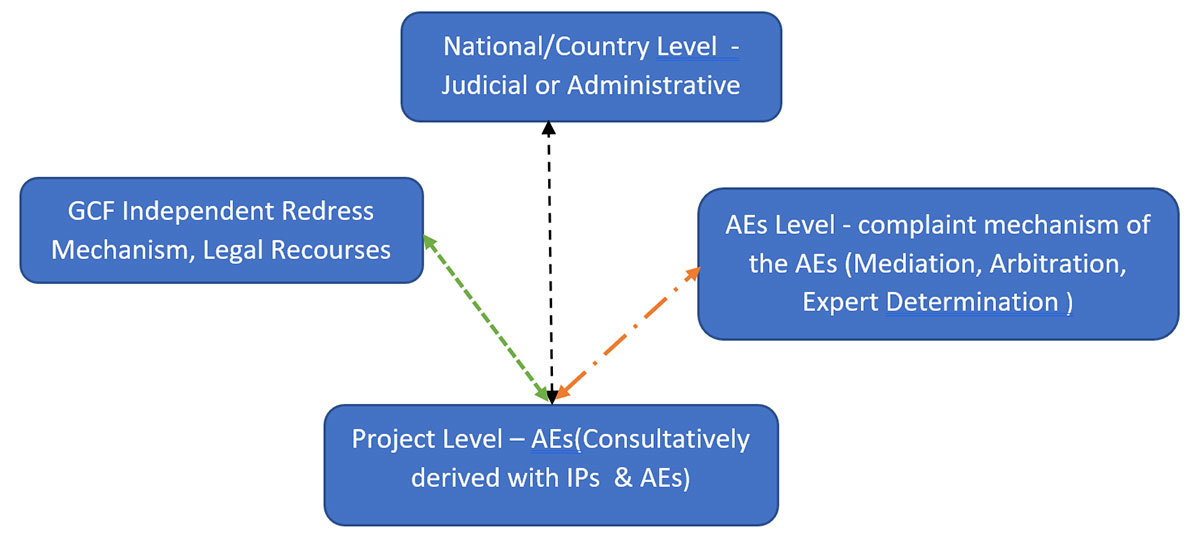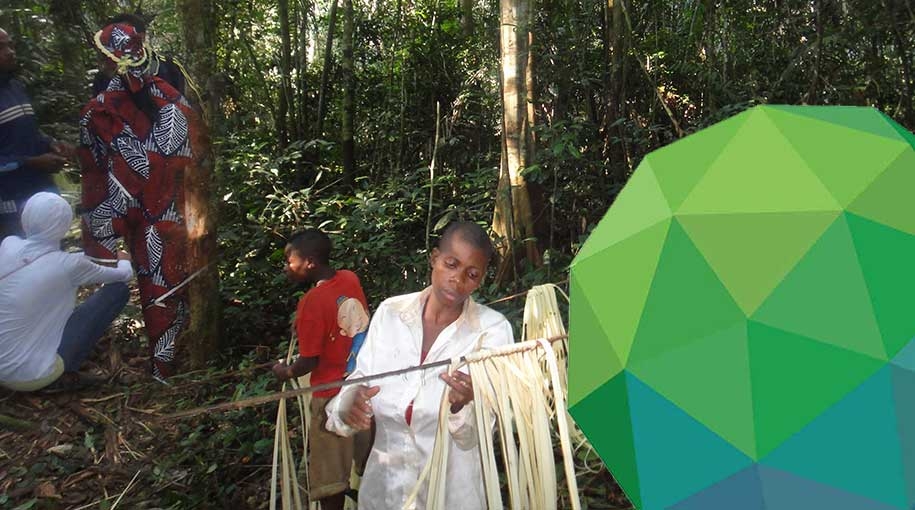-
Indigenous Peoples and the Green Climate Fund - An introduction
Climate change is essentially a question of people-nature relations. This relationship has been such that global natural systems and human’s basic survival have seriously been compromised through unsustainable exploitation of nature in the name of development. The overarching goal for global climate change actions under the UNFCCC is therefore an attempt by humanity to restore the desired positive/sustainable relations with nature.
On the other hand, indigenous peoples of the world have remained relatively faithful stewards of nature despite experiencing historical dispossession of their lands, territories and natural resources, including marginalization and exclusion in the sharing of the ‘goods/benefits’ of development. In addition, as peoples of the land and nature, whose livelihoods support systems are climate sensitive, they’re experiencing the ravages of climate change.
The Green Climate Fund is one of the global mechanisms that aspires to chart a new development pathway towards low emission and climate-resilient production system with a commitment to social inclusion and respect for Indigenous Peoples rights.
So far, the Green Climate Fund has committed at least 5billion dollars in support of climate change related projects in developing Countries, several of which will be implemented within Indigenous Peoples Territories. Will the GCF
-
What is A Grievance Redress Mechanism?
Grievance Redress Mechanisms (GRM) are processes that allow concerns to be raised and remedied. GRM provides a means by which affected individuals or communities can raise questions or concerns with a project proponent/implementor and have them addressed in a prompt and consistent manner. When applied effectively they offer the prospect of a more efficient, immediate and inexpensive form of dispute resolution for both project implementors and communities.
A grievance redress mechanism is essential to facilitate promotion of positive stakeholder relationships, by addressing concerns and preventing disputes from escalating and ultimately facilitates learning in order to improve the management of impacts.
A Grievance Mechanism is therefore a proactive and structured approach to receive, acknowledge, investigate, respond to and remedy complaints and grievances from local stakeholders/right holders in a planned, timely and respectful manner.
A GRM may take various forms – whether judicial, institutional, extrajudicial – and/or these may be based on existing traditional justice systems and structures. What is important is that both parties agree to the mechanism and that it is seen as fair, impartial, transparent and accessible, and with enough powers to act on complaints brought before it.
The mechanism should facilitate the lodging of complaints from/by communities and a means of documenting clear and complete capturing of issues and concerns raised by the communities.
The state justice system is often perceptually alien and geographically distanced, hence inaccessible to communities. Alternate Dispute Resolution (ADRs) mechanism, including those based on Indigenous/traditional communities’ value systems / customary law are increasingly being recognized and respected in national laws in Africa. Yet, existing legal framework for granting legal force to informal ADR processes and decisions such as those undertaken by the Council of Elders remains unclear, which makes enforceability of the outcomes challenging.
-
Aspirations of the Grievance Redress Mechanism of the GCF IP Policy
Conflict resolution and grievance redress is a key safeguard instrument of the GCF IP Policy. The envisioned GRM is informed by the objectives and key principles of the IP Policy, inter alia meaningful participation and FPIC of IPs in GCF related activities, respect for self-determination and representation of IPs, respecting gender and intergenerational equity, equitable access to GCF resources, commitment not finance activities resulting in the involuntary resettlement (forced eviction) of IPs or compensation when inevitable and commitment to capacity building.
These principles include the requirement that compensation and benefits be defined, delivered and distributed in full respect of traditional and customary rules and institutions, and ensuring gender equality.
The grievance redress elements of the Policy adopt an integrated and multilayered approach.[1] It contemplates engagement of the dispute resolution or problem-solving mechanism of the GCF accredited entity, applicable national laws/instruments, the GCF’s independent Redress Mechanism and the Project level/indigenous justice system.
The policy provides that users of the redress mechanism are provided with the necessary financial and technical support to access such mechanisms.
In addition, assistance could be accessed through the GCF Independent Redress Mechanism (IRM) and the Secretariat’s indigenous peoples’ focal point at any stage, including before a claim has been made.
Ultimately, when all grievance redress mechanism, including the IRM fail to deliver, the GCF can use legal settlement procedures as envisaged in the Accreditation Agreement.

The place of Accredited Entities in GRM: Ensuring Compliance
In addition to own GRM, Accredited entities are expected to consider applicable customary laws, laws and relevant international treaties and agreements obligation of the state and accountability mechanisms of the GCF.
Where claims by IPs are lodged with the independent Redress Mechanism, the GCF delivery chain actors are expected to not only corporate and provide all required information, but to ‘promptly implement remedial measures stipulated by the Board on the recommendation of the independent Redress Mechanism’ (GCF IP Policy para.71)
The Accredited Entity is expected to confirm that FPIC is dully undertaken, project risks and impacts of activities are appropriately disclosed to meet the requirements of the GCF Information Disclosure Policy and IP Policy; confirm that affected communities are consulted during the design and implementation of the activities and that appropriate grievance and redress mechanisms are established and function.
-
Strategic Linkages to Other relevant GCF Policies on Safeguards and Social Inclusion
Other critical Safeguards and GRM related policies of the GCF include the interim Social and Environmental Safeguards, Environmental and Social Management System (ESMS), Independent Redress Mechanism, Gender Policy, and the Information Disclosure policy. [2]
The GCF environment and Social policy commits to - “Avoid, and where avoidance is impossible, mitigate adverse impacts to people and the environment; enhance equitable access to development benefits; and give due consideration to vulnerable and marginalized populations, groups, and individuals, local communities, indigenous peoples, and other marginalized groups of people and individuals that are affected or potentially affected by GCF-financed activities.[3]
The ESMS explicitly clarifies that all GCF-financed activities will avoid adverse impacts on indigenous peoples, and when avoidance is not possible, will minimize, mitigate and/or compensate appropriately and equitably for such impacts, and respect and preserve indigenous culture, including the indigenous peoples’ rights to lands, territories, resources, knowledge systems, and traditional livelihoods and practices. The interim Environmental and Social Safeguards,[4] contains a list of requirements to be respected in order to avoid negative impacts on indigenous peoples.
The IP Policy clearly refers to the GCF Information Disclosure Policy [5] and specifies that Accredited Entities and Executing Entities will have to ensure that information will be disclosed in a timely and culturally appropriate way to indigenous peoples, in relevant language(s) and with sufficient time to revise and provide comments and share concerns if any.
Furthermore the GCF will have to ensure that all the information on FPIC and risks has been appropriately disclosed, and that affected communities have been properly consulted, and that a grievance mechanism is in place for communities to raise concerns and seek redress in case of negative impacts of project implementation and/or violation of the GCF policies.
The overarching Principles of the information Disclosure policy includes maximize access to information, limited exceptions, simple and broad access to information, explanations of decisions and right to review.
The Independent Redress Mechanism (IRM) is another avenue by which project affected people can seek redress, particularly when related to non-compliance with GCF policies or procedures.[6] The IRM helps project affected people or communities address problems by convening dialogues or conducting investigations in a manner that is timely, fair and independent. A complaint must be submitted within 2 years of the date that the complainant became aware of the negative impacts of the GCF project, or within 2 years of the closure of the GCF project.
The Fund’s Gender Policy commits to taking a gender-sensitive approach in all its programming, engagement with stakeholders and in access to benefits in recognition of the realties that Women and women contribute to, and are affected differentially by climate change impacts.
What should the grievance redress mechanism ensure for indigenous peoples?
- Your language will be respected and the different ways you might want to present your concerns taken into consideration
- The mechanism will have to take into account national laws and international obligations and standards, and also your traditional justice systems. It should also be able to avail itself of independent indigenous experts.
- Permits anonymous grievances & Respects confidentiality of all parties: Your name will be kept confidential if you fear threats or reprisals. In alternative an NGO or an authorized representative can file the complaint on your behalf.
- Protects all parties from retaliation: In any case measures will have to be taken to protect from retaliation.
- You will have the right to a translation or interpretation
- Maintains record of steps taken: All the information related to the grievance will be kept in writing and a database will be created ad shared with the GCF Independent Redress Mechanism
- The procedures will have to be made public, as well as information on how to submit grievances, how transparency of the process will be ensured, and decisions will be taken. A time limit within which you are expected to receive a response will also be set up Non-exclusive
- Allows cumulative learning for continuous improvement & change management
-
Translating Gains in Policy into Positive Progress in Livelihoods on the Ground
- Develop thorough knowledge and enhance understanding of the policy including the specific safeguards elements and the roles of the Entities involved and Build IPs’ capacities to enable self-identification and assessment of the risks associated with projects proposed for GCF funding
- IPs to undertake Self-determined situation analysis of their indigenous/ traditional institutions with mandate to safeguard and promote conflict resolution and, peace building. Also, useful to identify indigenous peoples’ experts in conflict resolution and raise their awareness on the policy provisions.
- Appreciate the import and dynamics of operationalizing FPIC processes at the community level, particularly indigenous community groups’ decision-making arrangements that should be engaged by the NDA and Accredited Entities during project implementation. This would enable clarity and capacity to exercise IPs’ right to FPIC
- Exercise your right to be consulted and participate in the design and implementation of the GCF funded activity, access to information and to have equitable access to the benefits - Pro-actively engaging with relevant actors along the GCF delivery chain – the Accredited, Entities, NDAs, The GCF Secretariat and the Board, including Independent Panels where necessary …. the NDA that has to provide a letter of “no objection,” notably a green light for projects that will be presented to the GCF Board
- Sustain engagement with the Indigenous Peoples Advisory Group to the GCF (IPAG)[7], and the Senior Specialists on IPs issues at the GCF Secretariat to keep a breast with emerging trends, monitor Accreditation of Entities, Proposal approval and provide feedback loops on the IP policy implementation.
[1] IP Policy, Par. 69 - 71
[2] The full text of the Environmental and Social Policy of the Green Climate Fund that include
the interim Social and Environmental Safeguards can be accessed here: https://www.greenclimate.fund/documents/20182/574763/GCF_policy_-_Environmental_and_Social_Policy.pdf/aa092a12-2775-4813-a009-6e6564bad87c
[3] https://www.greenclimate.fund/documents/environmental-social-policy
[4] the World Bank’s International Finance Corporation (IFC). Performance Standard 7 (PS7) on Indigenous Peoples
[5] For the full text of the information disclosure policy see: https://www.greenclimate.fund/documents/20182/574763/GCF_policy_-_Information_Disclosure_Policy.pdf/eca387d2-06b3-42c9-89f9-4976f2e802f4
[6] https://www.greenclimate.fund/independent-redress-mechanism
[7]Comprised of four IPs nominees from the four developing country regions: Latin America, Asia, Pacific, and Africa


